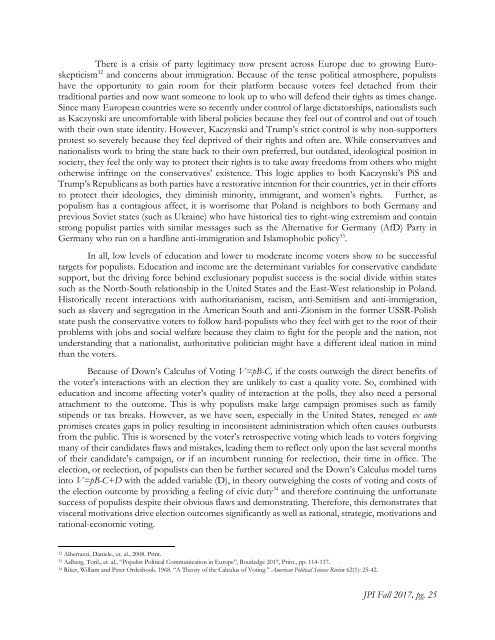JPI Spring 2018
You also want an ePaper? Increase the reach of your titles
YUMPU automatically turns print PDFs into web optimized ePapers that Google loves.
There is a crisis of party legitimacy now present across Europe due to growing Euroskepticism<br />
32 and concerns about immigration. Because of the tense political atmosphere, populists<br />
have the opportunity to gain room for their platform because voters feel detached from their<br />
traditional parties and now want someone to look up to who will defend their rights as times change.<br />
Since many European countries were so recently under control of large dictatorships, nationalists such<br />
as Kaczynski are uncomfortable with liberal policies because they feel out of control and out of touch<br />
with their own state identity. However, Kaczynski and Trump’s strict control is why non-supporters<br />
protest so severely because they feel deprived of their rights and often are. While conservatives and<br />
nationalists work to bring the state back to their own preferred, but outdated, ideological position in<br />
society, they feel the only way to protect their rights is to take away freedoms from others who might<br />
otherwise infringe on the conservatives’ existence. This logic applies to both Kaczynski’s PiS and<br />
Trump’s Republicans as both parties have a restorative intention for their countries, yet in their efforts<br />
to protect their ideologies, they diminish minority, immigrant, and women’s rights. Further, as<br />
populism has a contagious affect, it is worrisome that Poland is neighbors to both Germany and<br />
previous Soviet states (such as Ukraine) who have historical ties to right-wing extremism and contain<br />
strong populist parties with similar messages such as the Alternative for Germany (AfD) Party in<br />
Germany who run on a hardline anti-immigration and Islamophobic policy 33 .<br />
In all, low levels of education and lower to moderate income voters show to be successful<br />
targets for populists. Education and income are the determinant variables for conservative candidate<br />
support, but the driving force behind exclusionary populist success is the social divide within states<br />
such as the North-South relationship in the United States and the East-West relationship in Poland.<br />
Historically recent interactions with authoritarianism, racism, anti-Semitism and anti-immigration,<br />
such as slavery and segregation in the American South and anti-Zionism in the former USSR-Polish<br />
state push the conservative voters to follow hard-populists who they feel with get to the root of their<br />
problems with jobs and social welfare because they claim to fight for the people and the nation, not<br />
understanding that a nationalist, authoritative politician might have a different ideal nation in mind<br />
than the voters.<br />
Because of Down’s Calculus of Voting V=pB-C, if the costs outweigh the direct benefits of<br />
the voter’s interactions with an election they are unlikely to cast a quality vote. So, combined with<br />
education and income affecting voter’s quality of interaction at the polls, they also need a personal<br />
attachment to the outcome. This is why populists make large campaign promises such as family<br />
stipends or tax breaks. However, as we have seen, especially in the United States, reneged ex ante<br />
promises creates gaps in policy resulting in inconsistent administration which often causes outbursts<br />
from the public. This is worsened by the voter’s retrospective voting which leads to voters forgiving<br />
many of their candidates flaws and mistakes, leading them to reflect only upon the last several months<br />
of their candidate’s campaign, or if an incumbent running for reelection, their time in office. The<br />
election, or reelection, of populists can then be further secured and the Down’s Calculus model turns<br />
into V=pB-C+D with the added variable (D), in theory outweighing the costs of voting and costs of<br />
the election outcome by providing a feeling of civic duty 34 and therefore continuing the unfortunate<br />
success of populists despite their obvious flaws and demonstrating. Therefore, this demonstrates that<br />
visceral motivations drive election outcomes significantly as well as rational, strategic, motivations and<br />
rational-economic voting.<br />
32<br />
Albertazzi, Daniele., et. al., 2008. Print.<br />
33<br />
Aalberg, Toril., et. al., “Populist Political Communication in Europe”, Routledge 2017, Print., pp. 114-117.<br />
34<br />
Riker, William and Peter Ordeshook. 1968. “A Theory of the Calculus of Voting.” American Political Science Review 62(1): 25-42.<br />
<strong>JPI</strong> Fall 2017, pg. 25
















